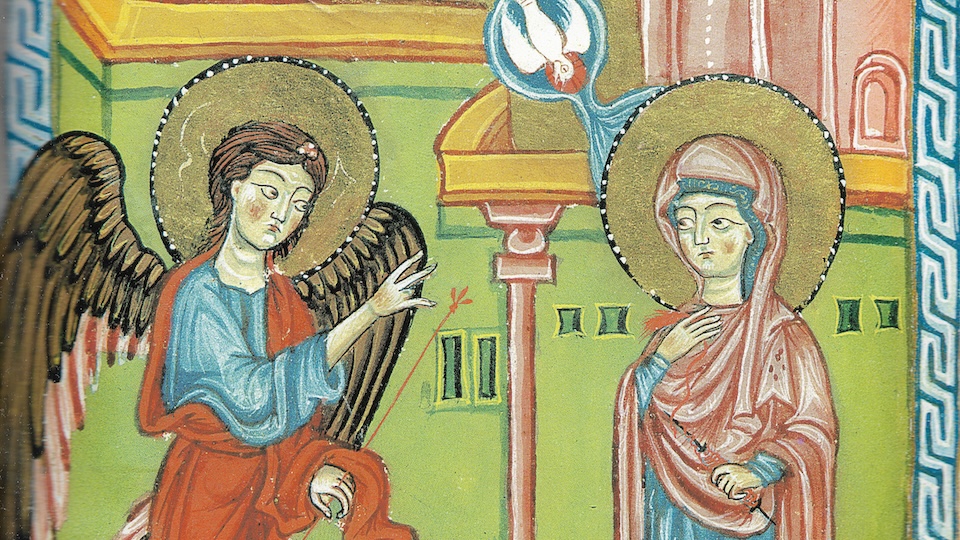

Pope’s General Audience – August 7, 2024
Pope Francis
Wednesday, August 7, 2024

"The Annunciation." University of Gladzor, Armenia. Wikimedia Commons.
On Wednesday, August 7, 2024, Pope Francis resumed his weekly cycle of catechesis during his General Audience. Continuing his series on "The Spirit and the Bride," he said that our belief that the Virgin Mary “'was found to be with child of the Holy Spirit' (Matthew 1:18) is the foundation that enables us to speak of Mary as the quintessential Bride, who is a figure of the Church." Read the full text of his address below. You can watch the full broadcast on Salt + Light TV on Thursday night at 7:00 pm ET, 4:00 pm PT and then on Salt + Light Plus.Dear brothers and sisters, good morning! With today’s catechesis, we enter into the second phase of salvation history. After contemplating the Holy Spirit in the work of Creation, we will contemplate it for a few weeks in the work of Redemption, namely of Jesus Christ. So, let us move on to the New Testament, and see the Holy Spirit in the New Testament. Today’s theme is the Holy Spirit in the Incarnation of the Word. In the Gospel of Luke, we read: “The Holy Spirit will come upon you” – to Mary – “and the power of the Most High will overshadow you” (1:35). The evangelist Matthew confirms this fundamental fact that regards Mary and the Holy Spirit, saying that Mary “was found to be with child of the Holy Spirit” (Matthew 1:18). The Church took up this revealed fact and very soon positioned it at the heart of her Symbol of faith. In the Ecumenical Council of Constantinople, in 381 – which defined the divinity of the Holy Spirit – this article enters into the formula of the Creed. It is therefore an ecumenical fact of faith, because all Christians profess together that same Symbol of faith. Catholic piety, since time immemorial, has drawn from it one of its daily prayers, the Angelus. This article of faith is the foundation that enables us to speak of Mary as the quintessential Bride, who is a figure of the Church. Indeed, Jesus, as St. Leo the Great writes, “just as He was born by the Holy Spirit from a Virgin Mother, so He makes the Church, His unblemished Bride, fruitful with the life-giving breath of the same Spirit” (12th Sermon on the Passion, 3, 6: PL 54, 356). This parallelism is taken up in the Dogmatic Constitution Lumen Gentium, which says: “By her belief and obedience, [Mary] brought forth on earth the very Son of the Father, showing an undefiled faith, not in the word of the ancient serpent, but in that of God’s messenger… The Church indeed, contemplating her hidden sanctity, imitating her charity and faithfully fulfilling the Father’s will, by receiving the Word in faith becomes herself a mother. By her preaching she brings forth to a new and immortal life the sons who are born to her in baptism, conceived of the Holy Spirit and born of God” (#63-64). Let us conclude with a practical reflection for our life, suggested by the insistence of the Scripture on the verbs “to conceive” and “to bear.” In the prophecy of Isaiah we hear: “Behold a young woman shall conceive and bear a son” (7:14), and the Angel says to Mary, “And behold, you will conceive in your womb and bear a son” (Luke 1:31). Mary first conceived, then bore Jesus: first she welcomed Him into herself, in her heart and her flesh, then she gave birth to Him. This happens for the Church: first she welcomes the Word of God, letting it “speak tenderly to her” (cf. Hosea 2:14), and “fill [her] stomach” (cf. Ezekiel 3:3), in accordance with two biblical expressions, and then she gives birth to it with her life and preaching. The second operation is sterile without the first. The Church too, when faced with tasks beyond her strength, spontaneously asks the same question: “How is this possible?” How is it possible to proclaim Jesus Christ and His salvation to a world that seems to seek only well-being? The answer is also the same as then: “You shall receive power when the Holy Spirit has come upon you” (Acts 1:8). Without the Holy Spirit the Church cannot move forward, the Church does not grow, the Church cannot preach. What is said about the Church in general also applies to us, to every baptized person. All of us sometimes find ourselves, in life, in situations beyond our strength and ask ourselves: “How can I cope with this situation?” It helps, in such cases, to repeat to ourselves what the angel said to the Virgin: “With God nothing will be impossible” (Luke 1:37). Brothers and sisters, let us too, every time, resume our journey with this comforting certainty in our hearts: “With God nothing will be impossible.” And if we believe this, we will perform miracles. With God nothing will be impossible. Thank you. ______________________________________________ APPEAL I continue to follow the situation in the Middle East with great concern, and I reiterate my appeal to all the parties involved that the conflict does not spread, and that there may be an immediate ceasefire on all fronts, starting with Gaza, where the humanitarian situation is very serious and unsustainable. I pray that the sincere search for peace will extinguish strife, love will overcome hatred and vengeance will be disarmed by forgiveness. I ask you to join in my prayer also for tormented Ukraine, Myanmar, Sudan: may these war-torn populations soon find the peace for which they yearn. Let us join our efforts and prayers that ethnic discrimination in regions of Pakistan and Afghanistan be eliminated, and especially discrimination against women. Text courtesy of Libreria Editrice Vaticana To read the full catalogue of Pope Francis' General Audiences, visit our General Audience blogroll.
Related Articles:
<<













